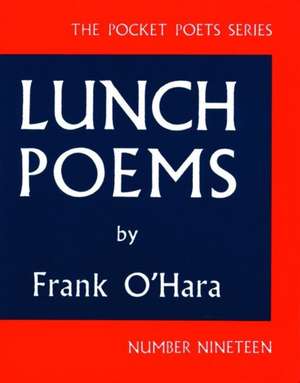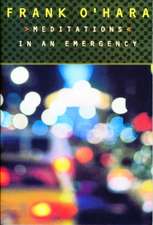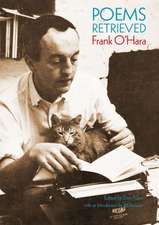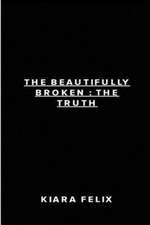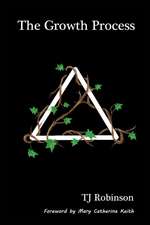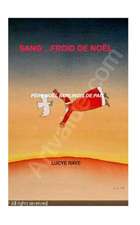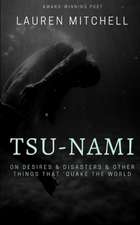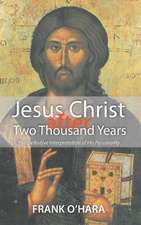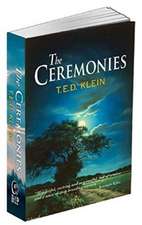Lunch Poems: City Lights Pocket Poets Series
Autor Frank O'Haraen Limba Engleză Paperback – 2001
Often this poet, strolling through the noisy splintered glare of a Manhattan noon, has paused at a sample Olivetti to type up thirty or forty lines of ruminations, or pondering more deeply has withdrawn to a darkened ware- or firehouse to limn his computed misunderstandings of the eternal questions of life, coexistence, and depth, while never forgetting to eat lunch, his favorite meal.
| Toate formatele și edițiile | Preț | Express |
|---|---|---|
| Paperback (1) | 47.01 lei 3-5 săpt. | +4.10 lei 7-13 zile |
| City Lights Publishers – 2001 | 47.01 lei 3-5 săpt. | +4.10 lei 7-13 zile |
| Hardback (1) | 88.45 lei 3-5 săpt. | |
| City Lights Books – 14 iul 2014 | 88.45 lei 3-5 săpt. |
Din seria City Lights Pocket Poets Series
-
 Preț: 40.08 lei
Preț: 40.08 lei -
 Preț: 81.03 lei
Preț: 81.03 lei -
 Preț: 66.57 lei
Preț: 66.57 lei -
 Preț: 50.28 lei
Preț: 50.28 lei -
 Preț: 79.95 lei
Preț: 79.95 lei -
 Preț: 102.25 lei
Preț: 102.25 lei -
 Preț: 87.39 lei
Preț: 87.39 lei -
 Preț: 79.95 lei
Preț: 79.95 lei -
 Preț: 88.05 lei
Preț: 88.05 lei -
 Preț: 81.85 lei
Preț: 81.85 lei -
 Preț: 75.64 lei
Preț: 75.64 lei -
 Preț: 78.98 lei
Preț: 78.98 lei -
 Preț: 98.75 lei
Preț: 98.75 lei - 24%
 Preț: 60.99 lei
Preț: 60.99 lei
Preț: 47.01 lei
Nou
8.100€ • 9.36$ • 7.53£
Carte disponibilă
Livrare economică 21 februarie-07 martie
Livrare express 07-13 februarie pentru 14.09 lei
Specificații
ISBN-10: 0872860353
Pagini: 76
Dimensiuni: 124 x 157 x 5 mm
Greutate: 0.1 kg
Editura: City Lights Publishers
Colecția City Lights Publishers
Seria City Lights Pocket Poets Series
Locul publicării:United States
Notă biografică
Among the most significant post-war American poets, Frank O'Hara grew up in Grafton, MA, graduating from Harvard in 1950. After earning an MA at Michigan in 1951, O'Hara moved to New York, where he began working for the Museum of Modern Art and writing for Art News. By 1960, he was named Assistant Curator of Painting and Sculpture Exhibitions at MOMA. Along with John Ashbery, Kenneth Koch, James Schuyler and Barbara Guest, he is considered an original member of the New York School. Though he died in a tragic accident in 1966, recent references to O'Hara on TV shows like Mad Men or Thurston Moore’s new single evidence our culture’s continuing fascination with this innovative poet.
Recenzii
"We all know lunch hour isn't actually for eating lunch; it's for running to the bank, going shopping, or throwing back a few midday business shots. In the case of Frank O'Hara, it was for poetry, and his might have been the best use of those precious 60 minutes in the whole dreary history of the corporate custom."--Heather Baysa, The Village Voice
"Frank O’Hara’s delightful conversational volume Lunch Poems was published by City Lights in San Francisco fifty years ago, and has remained in print in its original Pocket Poets format ever since. In an anniversary hardback edition, Lawrence Ferlinghetti writes that the poems 'established a certain tone, a certain turn of phrase, a certain urbane wit, at once gay and straight, that came to identify the New York School of poets in the 1960s.'"--James Campbell, Times Literary Supplement UK
"O’Hara's mystique, and the seductive power of his work, have lingered, and in recent years have grown even stronger. What distinguishes O'Hara's poetry? It is not just a remarkable grasp of the zeitgeist but the way his poems manage to feel contemporary, no matter what the year, the ways in which he broke new ground."--Jane Ciabattari, BBC.com
"Don't miss out. With your fave libation in hand, celebrate Lunch Poems--the little book that's still the life of the party."--Kathi Wolfe, The Washington Blade
"Although scholars have discussed and quoted from the correspondence between O’Hara and Ferlinghetti about the publication of Lunch Poems before, this is the first time the letters have been published, so it's a real treat to see them in print."--Andrew Epstein, Associate Professor, English Dept, Florida State University
"'My life held precariously in the seeing / hands of others.' Fifty years since its now-iconic orange and blue cover re-entered the bustling, amorous New York City from which they were derived, City Lights has reissued the collection with a new introduction and a supplementary appendix with facsimile drafts, letters, and other wonders."--Staff at WORD Bookstore, Brooklyn, NY
"Nearly 50 years since his death, much American lyrical poetry today also seems timid by comparison, suggestive of pious poets in ascetic isolation from a vulgar, fallen world. . . . What is happening to him now is that his influence on both contemporary American poetry and on pop culture is greater than ever. . . . Lunch Poems has just been republished by City Lights Books in an expanded edition that includes a preface by O’Hara’s New York compatriot John Ashbery and an appendix filled with facsimiles of correspondence spanning 1963 to 1965 between O’Hara and the book’s publisher, Lawrence Ferlinghetti."--Tim Keane, The Brooklyn Rail
"In the 1950s people like me noticed O'Hara because his subjects were often the subjects we would have chosen if we had been poets--jazz, movie stars, abstract expressionist painting, race, the intensity of urban life. Music, art and their attached legends energized his lines. The poems were crafted with care but always seemed spontaneous, as if scrawled in his notebooks during parties, meetings, trips on the subway. They were always personal, city life woven into a rueful version of himself. To like him it was necessary to like irony."--Robert Fulford, National Post
"The expanded 50th anniversary edition of Lunch Poems by Frank O'Hara is a glorious tribute to the book, as well as to the genius of the poet himself. Poet John Ashbery wrote the preface, and publisher/poet Lawrence Ferlinghetti writes about the anniversary edition. If you haven't read this essential volume of poetry, including the amazing poem 'Ave Maria,' you don't know what you're missing."--Gregg Shapiro, Bay Area Reporter
